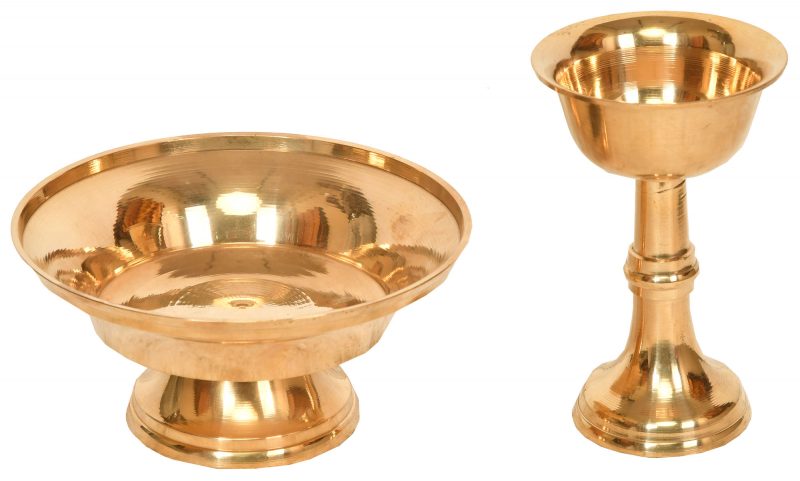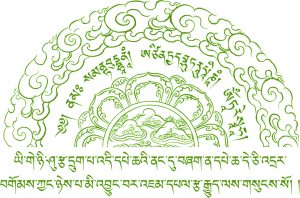
O Serkyem ou Serchien, é uma taça de oferenda para os protetores é um item ritual importante para praticantes da Tradição Vajrayana. Enquanto estiver no caminho da iluminação, um praticante definitivamente encontrará muitos obstáculos. No Vajrayana, os protetores são considerados manifestações das atividades dos Budas. Eles estão empenhados em ajudar os praticantes, protegendo-os dos obstáculos no caminho, melhorando sua motivação e aprimorando sua prática, de modo a garantir que sua prática seja bem-sucedida. Assim, invocar os protetores fazendo oferendas para eles é semelhante a solicitar ajuda enquanto alguém está viajando na estrada, para garantir que se atinja o destino pretendido.
Serkem (Libation Offering)
The word serkem is an honorific term for offering libation. Kem is an old term for alcohol or container of alcohol. So offering of alcohol from a wooden jug or from a container is called offering kem. When the kem is poured into a bowl or a cup, made of or plated with gold (ser), then the offering becomes serkem. Similarly, when one makes a special offering of alcohol to an important figure or divinity, it is also called serkem or golden libation. It is an honorific term indicating that one is offering the best alcohol in the best container.
What should one think of while offering serkem?
When one offers serkem, one takes the container of alcohol and blesses it by means of meditation and chanting of the mantra ‘Oṃ Aḥ Huṃ’. Om turns everything into a great expanse of emptiness, Ah converts the materials, in full awareness of the state of emptiness, into fantastic offerings of nectar and Huṃ turns the nectar into all kinds of pleasant offerings and distributes them to deserving recipients. In this way, one makes the serkem offering to all the Buddhas, Bodhisattvas and sentient beings.
The Bhutanese use written liturgies for offering serkem. The two most common serkem in Bhutan are Degay serkem, in which one offers serkem to eight classes of spirits. The world of powerful non-human spirits is classified into eight categories and serkem is offered to them. The most popular practice of serkemBhutanese do in formal occasions is marchang. It is called marchang because it is an alcohol offering with butter decorations. In the most common marchang liturgy Bhutanese use, the offering is made to all gurus including both the immediate root guru and the gurus in the lineage, to all different divinities mentioned in tantric texts, to ḍākini and ḍāka spiritual beings who help Buddhist practitioners and reside in powerful holy site, to all the dharma protector deities led by Mahākāla Yeshe Gyonpo and finally to sentient beings including the spirits who reside in the house and place.
The alcohol represents the five nectars that help develop inner spiritual experience. The offering is made in the context of tantric Buddhism and helps overcome worldly
Serkem (Libation Offering)
The word serkem is an honorific term for offering libation. Kem is an old term for alcohol or container of alcohol. So offering of alcohol from a wooden jug or from a container is called offering kem. When the kem is poured into a bowl or a cup, made of or plated with gold (ser), then the offering becomes serkem. Similarly, when one makes a special offering of alcohol to an important figure or divinity, it is also called serkem or golden libation. It is an honorific term indicating that one is offering the best alcohol in the best container.
What should one think of while offering serkem?
When one offers serkem, one takes the container of alcohol and blesses it by means of meditation and chanting of the mantra ‘Oṃ Aḥ Huṃ’. Om turns everything into a great expanse of emptiness, Ah converts the materials, in full awareness of the state of emptiness, into fantastic offerings of nectar and Huṃ turns the nectar into all kinds of pleasant offerings and distributes them to deserving recipients. In this way, one makes the serkem offering to all the Buddhas, Bodhisattvas and sentient beings.
The Bhutanese use written liturgies for offering serkem. The two most common serkem in Bhutan are Degay serkem, in which one offers serkem to eight classes of spirits. The world of powerful non-human spirits is classified into eight categories and serkem is offered to them. The most popular practice of serkemBhutanese do in formal occasions is marchang. It is called marchang because it is an alcohol offering with butter decorations. In the most common marchang liturgy Bhutanese use, the offering is made to all gurus including both the immediate root guru and the gurus in the lineage, to all different divinities mentioned in tantric texts, to ḍākini and ḍāka spiritual beings who help Buddhist practitioners and reside in powerful holy site, to all the dharma protector deities led by Mahākāla Yeshe Gyonpo and finally to sentient beings including the spirits who reside in the house and place.
The alcohol represents the five nectars that help develop inner spiritual experience. The offering is made in the context of tantric Buddhism and helps overcome worldly prejudices, discrimination, taboos and emotions among others. It is a ritual Bhutanese usually practise at inaugural events and before undertaking a new project.
Karma Phuntsho is the Director of Shejun Agency for Bhutan’s Cultural Documentation and Research, founder of the Loden Foundation and the author of The History of Bhutan. The piece was initially published in Bhutan’s national newspaper Kuensel in a series called Why we do what we do.





 Cintamani - Meditação e Arte - Copyright 2020 - Todos os direitos reservados.
Cintamani - Meditação e Arte - Copyright 2020 - Todos os direitos reservados.